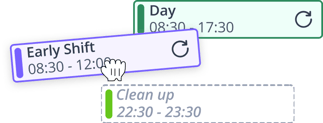Navigating the delicate balance of maintaining punctuality and managing latecomers is a challenge every leader faces. Tardiness can disrupt workflow, impact productivity, and create tension within the team.
However, dealing with late employees requires a strategic approach that combines empathy, clear communication, and firmness. In this blog, we'll delve into actionable strategies to address and rectify habitual lateness, fostering a culture of punctuality and mutual respect.
Whether you're a seasoned manager or a budding leader, these insights will empower you to transform your team's time management skills and ensure a harmonious and productive working environment.
Handling tardiness with policy, compassion, and solutions
Dealing with late employees should be handled using a strategic triple approach. The first step is to establish your policy for attendance and punctuality. The second is to remain flexible and compassionate in the face of unforeseen emergencies.
No one can predict a blown tire or sick children. And if tardiness becomes a recurring problem, leadership can help employees either seek solutions or face consequences for failing to respect the team and the impact their lateness may have.
Knowing when to exercise compassion, flexibility, or firm enforcement depends on the type of employee lateness you are dealing with. The matter can vary from instance to instance, person to person, and must adapt as patterns begin to form. This approach will help you achieve your true goal: whole-team punctuality.
The 5 types of employee lateness
In the workplace, there are five types of employee lateness, and employers must determine what they are dealing with when deciding how to respond and whether to enforce penalties on the late employee.
- One-Time Incidents: Emergencies such as car trouble, freeway accidents, or family issues can cause someone to be late once.
- Late-Start Tardiness: Employees arrive on time but are not ready to begin their workday until 10–30 minutes after clocking in.
- Occasional Lateness: Periodic lateness due to minor but recurring issues like traffic delays or poor morning routines.
- Chronic Late Arrival: Routinely arriving late without making an effort to change.
- Epidemic Lateness: When multiple employees begin arriving late due to unenforced punctuality policies.
Each type of lateness warrants a different strategy. A comprehensive approach should discourage lateness, provide solutions, and apply penalties if no improvements are made.
Clarify your expectations regarding arrival and readiness
The first step in dealing with employees late for work is to establish your expectations. Company culture plays a significant role in punctuality.
Some workplaces overlook lateness, while others are highly impacted by even small delays. Leaders must clearly communicate arrival and readiness expectations, including when to clock in and when work should begin.
Useful Read: How to Create a Clocking In and Out Policy That Works + Free Template
One-time incidents: Offer flexibility and understanding

When an employee is late once, it’s usually due to an uncontrollable emergency. Forgiving occasional lateness builds trust and proves that personal emergencies will not be unfairly penalised.
Address the impact of occasional to regular tardiness
The severity of response depends on how lateness impacts operations. For example, lateness in a restaurant or production line may warrant stricter consequences compared to flexible creative workplaces.
Establish how employees should report late arrival
Create a clear policy on how and when employees should notify managers if they are running late. Provide accessible methods such as phone calls, texts, or emails to minimise disruption.
Create reasonable consequences for routine or chronic lateness
Consequences should discourage lateness but remain legal and fair. Avoid docking pay excessively. Instead, consider redistributing responsibilities or limiting privileges to encourage punctuality.
Increase on-time accountability
Implement a clock-in system to track arrival
Time clocks make employees more aware of punctuality. Options include physical clocks or apps that log arrival times.
Useful Read: What to Look For in a Clock In Clock Out System
Hold a meeting to start each shift
Starting each shift with a team meeting creates social accountability. Employees are less likely to be late when their absence is noticeable to peers.
Include punctuality in performance reviews
Incorporating punctuality into performance reviews motivates employees to improve arrival times, especially when linked to raises or promotions.
Offer solutions to help employees arrive on time

Leaders can provide proactive solutions for common lateness triggers such as traffic or public transport delays.
Make arriving early more appealing with breakfast and break facilities
Offering breakfast, a gym, or lounge areas encourages employees to arrive early, giving them a buffer against unexpected delays.
Start employees at the same time every day
Consistent start times make routines easier to follow and reduce confusion that can cause lateness.
Consider flexible schedule options
Allowing flexibility, such as staggered start times, can accommodate employees with predictable delays while maintaining productivity.
Handling employee lateness with scheduling
Employee scheduling, time-tracking, and absence management are challenges that Shiftbase helps solve. With its digital punch clock, businesses can track lateness, foster accountability, and build a culture of punctuality. Experience Shiftbase’s punch clock with a 14-day free trial.

- Easily clock in and out
- Automatic calculation of surcharges
- Link with payroll administration



